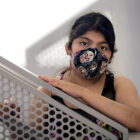Tens of thousands of Connecticut infants and toddlers are at risk for social and emotional problems, and the professionals who interact with them most need mental health training in order to help them, according to a report released this week. Children who live in poverty, are homeless or have suffered abuse or neglect are among those most likely to experience trauma at a young age, according to the report by the Child Health and Development Institute (CHDI) of Connecticut, and the key to helping them is providing the right support. “There is a tremendous opportunity to improve children’s lives by promoting a child’s secure attachment with a caregiver from the beginning,” said Judith Meyers, a psychologist and president and CEO of CHDI. “Professionals who care for young children are in the unique position to help families develop nurturing relationships.”
The nonprofit institute suggests that all doctors, teachers, early care providers and others who work with infants and toddlers in Connecticut be trained in infant mental health. Helping children process and cope with trauma early is essential to their future success, said Melissa Mendez, co-lead author of the report and associate director of early childhood at the Wheeler Clinic in Plainville.
